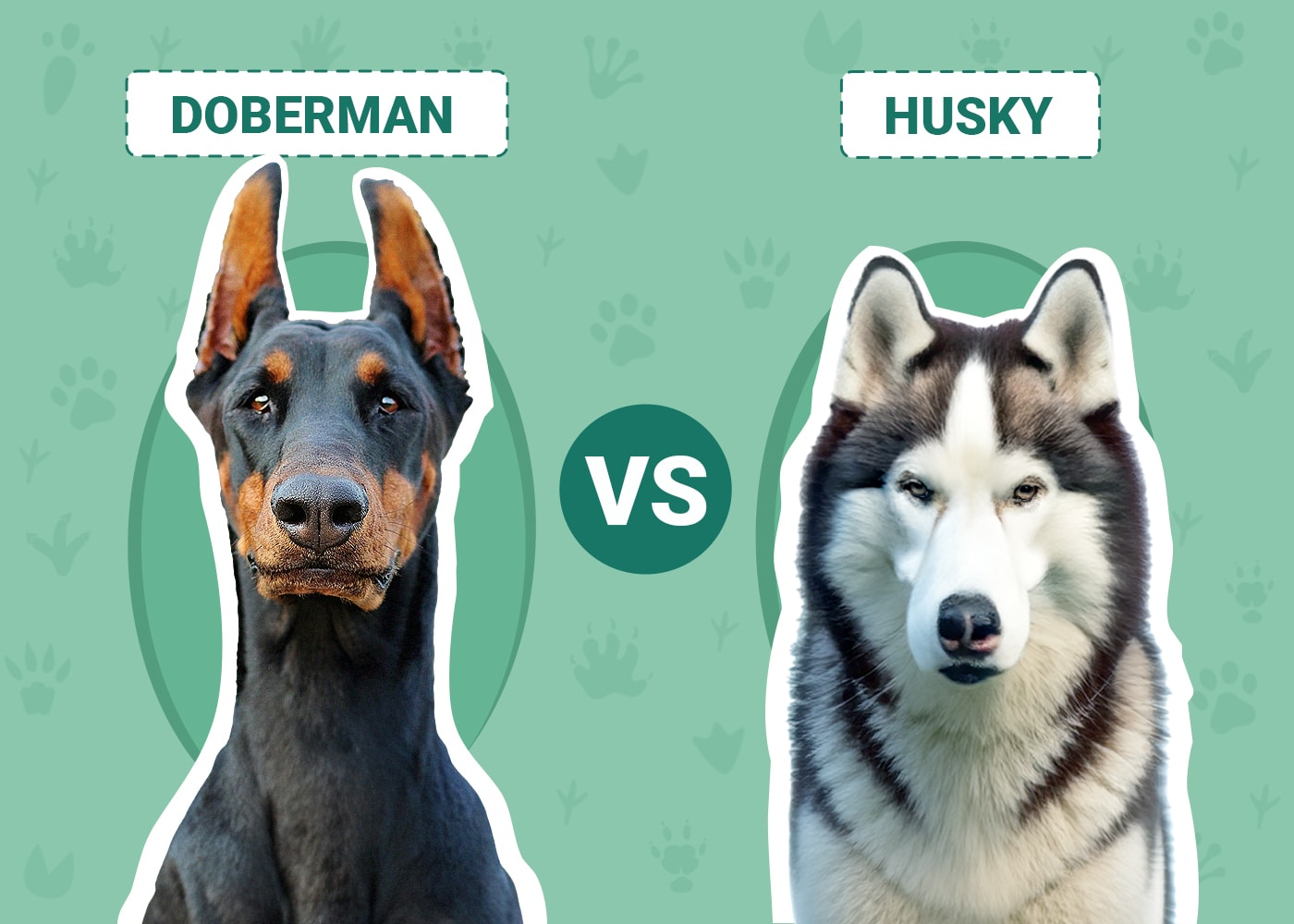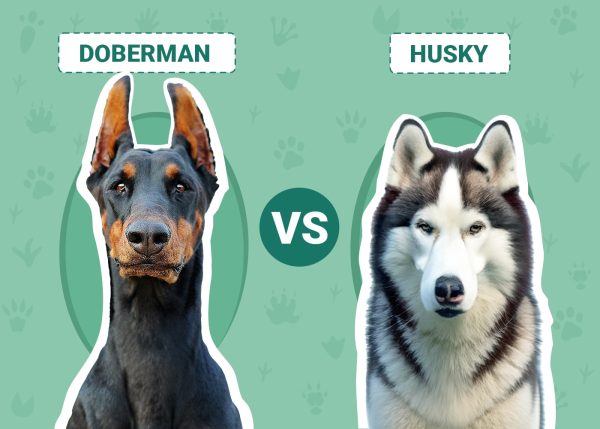Click to Skip Ahead
If you’ve been looking for a new dog and have narrowed down the breeds you’re interested in to include the or the Husky, you might be having trouble picking between these dogs. While the Doberman and the Husky look absolutely nothing alike, they have some commonalities regarding their personality and how well they get along with people and other pets. There are some major differences, though!
To help you make the decision on which breed would be the best for you and your family, we’re taking a closer look at the Doberman and the Husky to find out how they’re alike and different.
Visual Differences
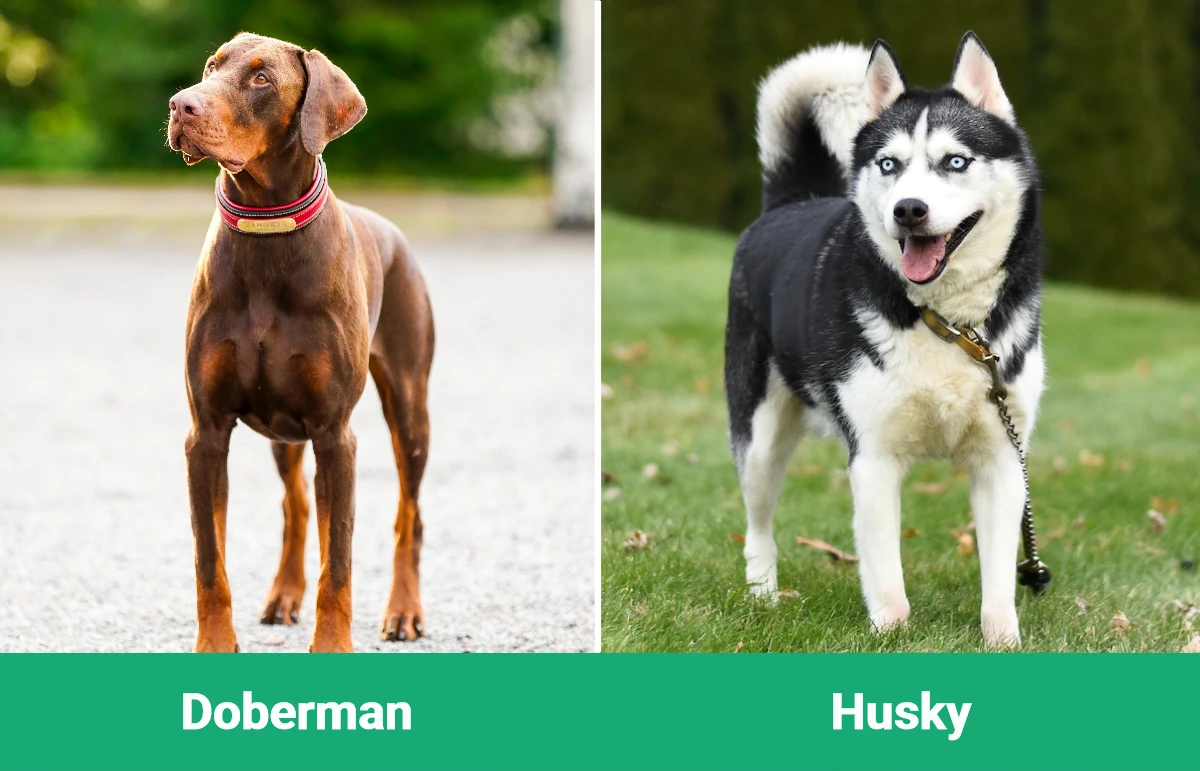
At a Glance
- Average height (adult): 24–28 inches
- Average weight (adult): 60–100 pounds
- Lifespan: 10–12 years
- Exercise: 1+ hours a day
- Grooming needs: Mild
- Family-friendly: Yes
- Other pet-friendly: Sometimes
- Trainability: Protective, active, loving
- Average height (adult): 20–23.5 inches
- Average weight (adult): 35–60 pounds
- Lifespan: 12–14 years
- Exercise: 1+ hours a day
- Grooming needs: Moderate
- Family-friendly: Yes
- Other pet-friendly: With dogs
- Trainability: Affectionate, friendly, high-energy
Doberman Overview
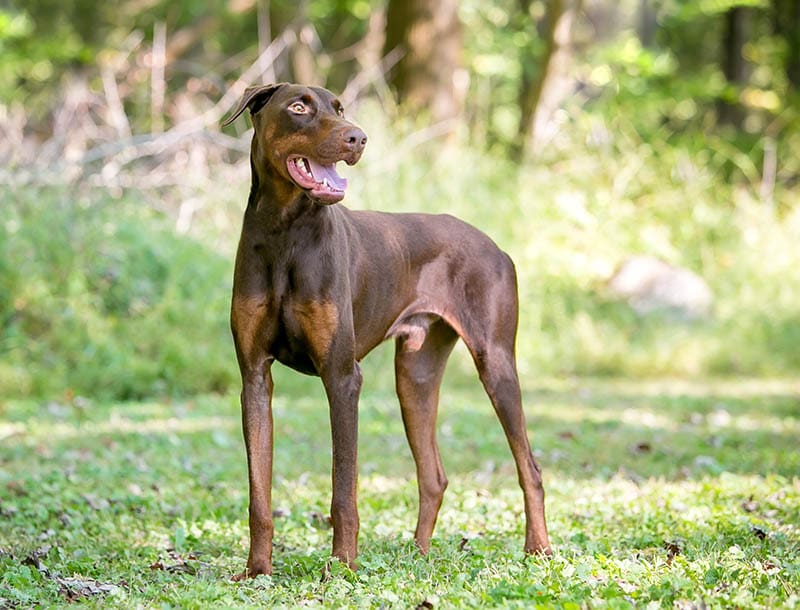
Dobermans originated in Germany in the 1890s as guard dogs. Specifically, the breed came about due to a tax collector who wanted a vicious dog to guard him while he made his rounds and carried money about. The dog breeds the tax collector was already familiar with just weren’t aggressive enough for him, so he mixed several of those together to get the Doberman. Which breeds those were precisely, no one knows, but they may include the Rottweiler, Manchester Terrier, Greyhound, Beauceron, Great Dane, black and tan terrier, Weimaraner, and German Shorthaired Pointer.
Of course, the Doberman is less aggressive and vicious these days. Instead, it is a loyal dog that loves to work and can be a great pet for the right people.
Personality
As we said, the Doberman was quite literally bred to be aggressive and vicious, which is one reason it gets such a bad rep these days. However, for years breeders have been purposely breeding out aggressive traits in the Doberman, so that rep is somewhat unfair. Dobermans can actually be some of the sweetest and most loyal pets you’ll ever have. When socialized from puppyhood, this breed can be affectionate, loyal, and protective with the whole family, down to the smallest family member.
Dobermans are also incredibly intelligent, which makes training them an easier job to undertake. Being intelligent means, though, that if these pups aren’t properly exercised and mentally stimulated, they will become bored and destructive. So, you’ll need to ensure your Doberman gets tons of play and exercise. You’ll also want to give it jobs around the home to satisfy the working dog part of it.
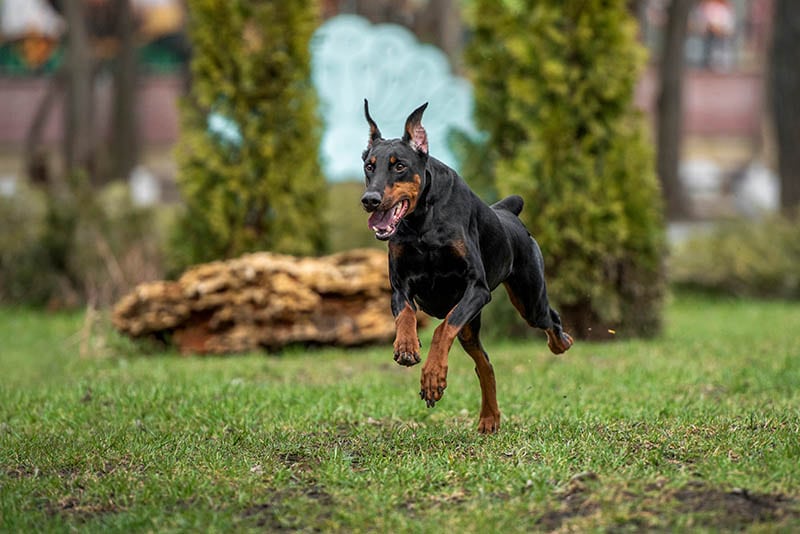
Training
Because the Doberman is such an intelligent breed, training is simpler, which is good for you because this breed must be trained. Without being properly trained and socialized, the negative traits of the Doberman, such as aggressiveness or destructive behavior, can overtake the positive traits of the breed. So, begin training and socializing your dog with other people and animals as soon as you get them.
One excellent way to train your Doberman is through clicker training, as they do particularly well with it, as this breed thrives on training that relies on positive reinforcement. Dobermans need positive reinforcement when being trained, so be sure you have plenty of praise and treats to go around. If you feel like you aren’t up to the task of training your Doberman, though, you can always find a reputable trainer to help out.
Health & Care
The Doberman is a fairly hardy breed of dog, but that doesn’t mean there aren’t a few diseases it is prone to.
These diseases include:
- Eye problems
- Bloat
- Hepatitis
- Cardiomyopathy
- Von Willebrand’s Disease
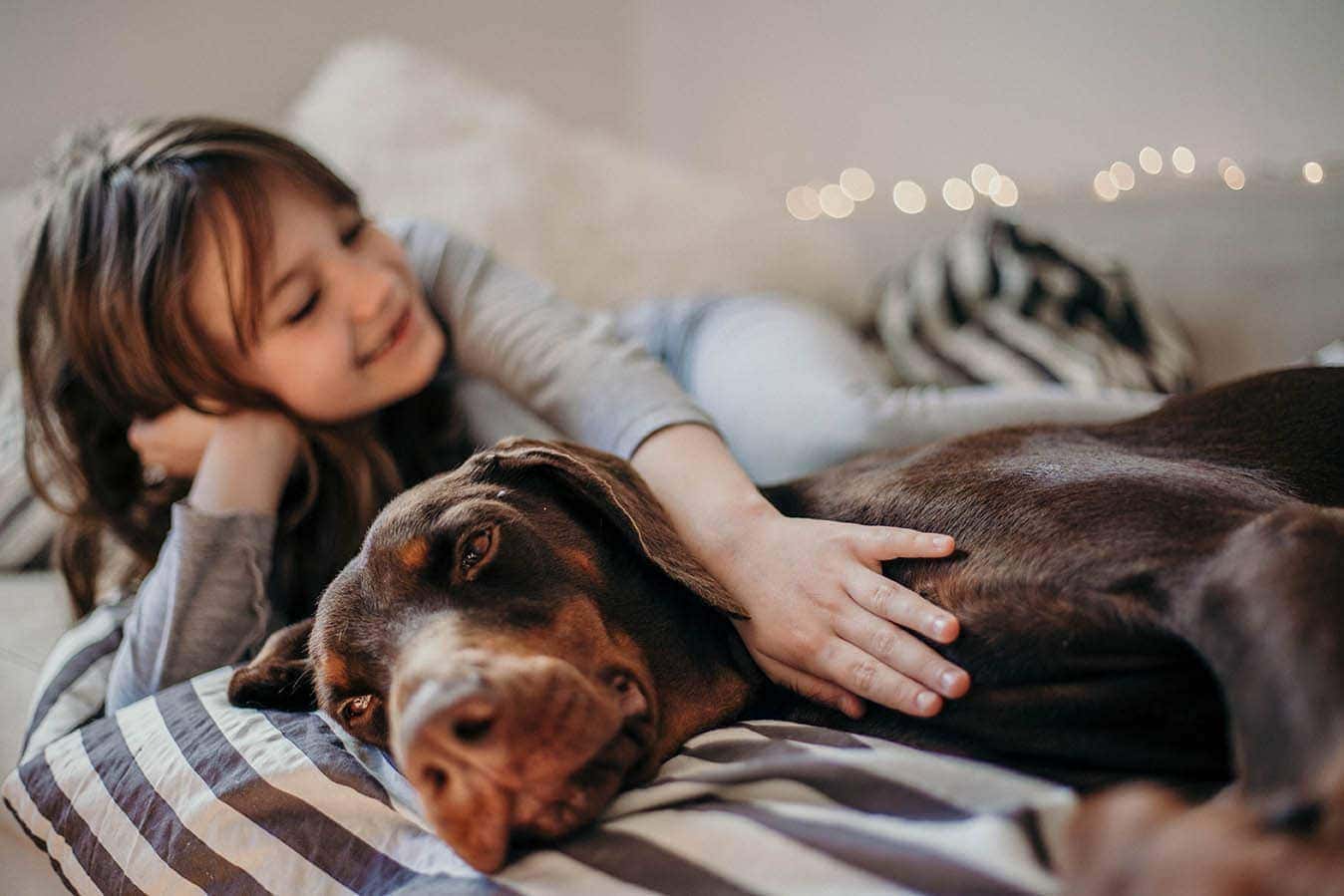
Suitable for:
The Doberman will get along well with all family members, including small children, so long as it is properly trained and socialized from a young age. And because it can be quite protective, this breed makes an excellent watchdog, as well as a pet. But Dobermans have been known to develop a bond with a single family member that can get a bit possessive, resulting in separation anxiety and negative behaviors when that person is away from the dog.
When it comes to other pets, so long as the Doberman is socialized well and early, it should be able to get along with pets of any size.
Husky Overview
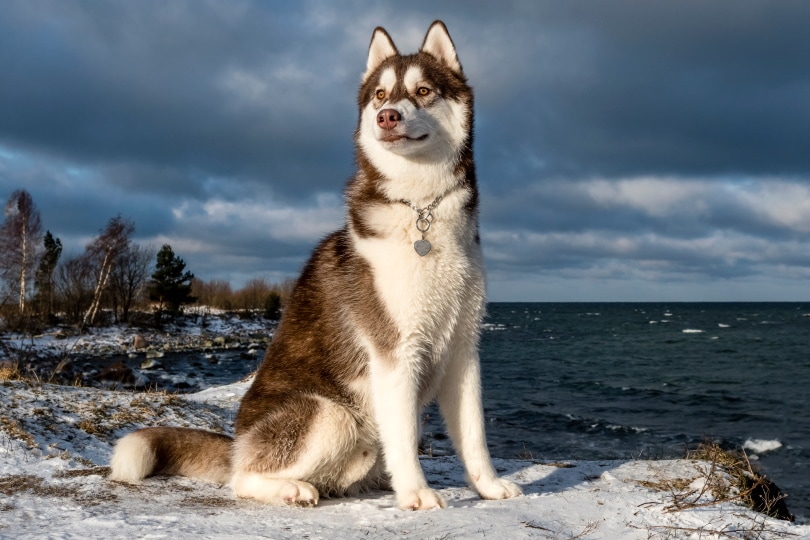
The Husky is a Nordic breed, bred in Siberia, that was created to be a pack animal that engaged in sled-pulling. They came to the United States (Alaska, specifically) in 1908 to pull sleds here as well. These days, the Husky may sometimes still be a sled-pulling dog in competitions, but it’s also often a well-loved household pet.
Personality
Besides looking absolutely beautiful with their striking eyes, the breed is affectionate, friendly, and high-energy, making them tons of fun to be around. Plus, as pack animals, they love to be around their families, so they are extremely loyal. And since they are working dogs, Huskies also enjoy having jobs to do around the home—anything that will keep them busy and active. These pups need to stay active, so you’ll find yourself engaging in plenty of long walks and playing with this breed.
Any owner of a Husky will find themselves working to keep up with this pup with its need for activity and attention!
Training
Huskies aren’t quite as clever as Dobermans (they only ranked 74th on the list of most intelligent dogs versus the Doberman’s ranking of 5th), but they are used to taking commands, so training them shouldn’t be too much of a hassle. Like most dog breeds, the Husky will also need to be socialized from a young age, particularly when it comes to other animals, as this pup has a strong prey drive and won’t hesitate to chase smaller pets.
Positive reinforcement will be key (never use negative reinforcement during training!), but if you feel you won’t have the time to devote to the job, seek a reputable trainer to take over.
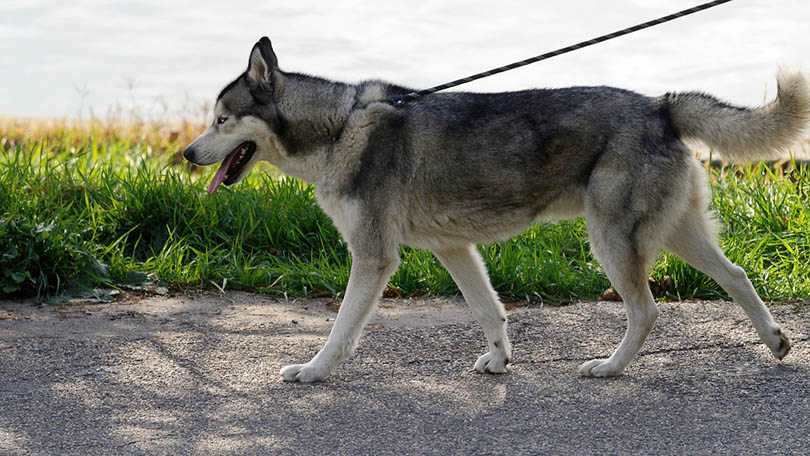
Health & Care
The Husky is an extremely healthy breed for the most part, but they do suffer from a few genetic conditions.
The most common health conditions in Huskies are:
- Hip dysplasia
- Juvenile cataracts
- Progressive retinal atrophy
- Uveodermatologic syndrome
- Follicular dysplasia
Suitable for:
The Husky breed absolutely adores people, so they are great for pretty much anyone—families or singles. They even get along with children; you just need to ensure you teach them to be careful around kids, as the Husky is prone to being rambunctious at times. And children should be taught to treat the Husky with care as well. These dogs are incredibly active, though, so they’re not the best choice for those with an aversion to exercise.
Huskies also tend to get along well with other dogs, but smaller animals, like cats, could be an issue due to the breed’s strong prey drive. However, if you work at socializing your Husky immediately, you may be able to break that habit of chasing things (though this isn’t a guarantee).
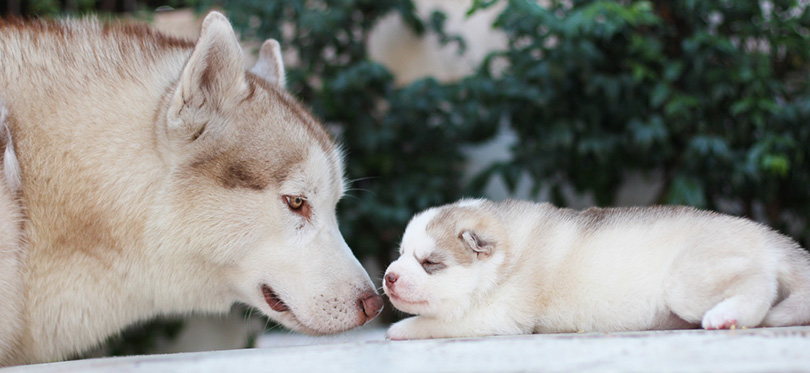
Which Breed Is Right for You?
Whether a Doberman or a Husky is right for you will depend upon how active you are, whether you have other pets and the kind of look you want in a dog. Those who are more inclined to spend a day watching Netflix rather than hiking won’t do as well with either breed. But those that are active on a regular basis will. Those with smaller pets in the home, such as cats, will likely have issues with the Husky chasing these pets, whereas the Doberman should do better in that regard.
Other than those two aspects, it really comes down to the kind of look you’ve been seeking—muscular and lean or poofy and striking!
Featured Image Credit: Top – DSD, Pexels | Bottom – Ivanova N, Shutterstock

